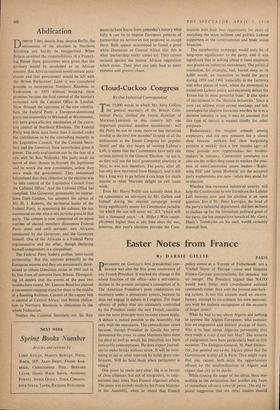Abdication
DESPITP. Tibet, despite Iraq, despite Berlin, the seriousness of the situation in Northern Rhodesia can hardly be exaggerated. When Britain accepted the responsibilities of a Protect- ing Power there, guarantees were given that the territory would be developed as an African country, that African interests would remain para- mount and that government would be left with the British Parliament. Later it was considered possible to incorporate Northern Rhodesia in Federation in 1953 without breaking these promises because the final control of the territory remained with the Colonial Office in London. Now, through the operation of the new constitu- tion, the Federal Party, a European-dominated party not responsible to Whitehall or Westminster, has been given effective domination of the execu- tive council of Northern Rhodesia. The Federal Party won three seats fewer than it needed under the constitution to be the controlling majority in the Legislative Council. Yet the Colonial Secre- tary and the Governor have nevertheless given it power. The only explanation can be the fear of a row with Sir Roy Welensky. His party made no secret of their threats to boycott the legislature and to wreck the new constitution, unless they were made the government. They announced beforehand that their objective in the election was `to take control of the Legislative Council from the Colonial Office.' And the Colonial Office has complied. The Governor, presumably on instruc- tions from London, has accepted the advice of Mr. H. J. Roberts, the territorial leader of the Federal Party, in appointing his cabinet. He has nominated no one who is not persona grata to that party. The cabinet is now composed of an equal number of elected members (European Federal Party men) and civil servants, two Africans nominated by the Governor, and the Governor himself. One of the Africans is a Federal Party representative and the other, though declaring himself independent, is a sympathiser.
The Federal Party leaders profess 'inter-racial partnership.' But this operates primarily in the European interest and they are passionately deter- mined to obtain Dominion status in 1960 and to be free from all restraint from Britain. Disregard- ing all doubts that the events of the past two months have raised, Mr. Lennox-Boyd has planted a convenient stepping-stone for them in the middle of a flooding Rubicon. Control of the copper belt is control of Central Africa; and British abdica- tion in Northern Rhodesia is abdication in the whole Federation.
Neither the Colonial Secretary nor Sir Roy seems to have learnt from yesterday's history what folly it can be to impose European patterns of partnership on territories not prepared to accept them. Both appear determined to found a great white Dominion in Central Africa (for this is what 'partnership' really comes to). They cannot succeed against the intense African opposition which exists. Their plan can only lead to more violence and greater chaos.


































 Previous page
Previous page